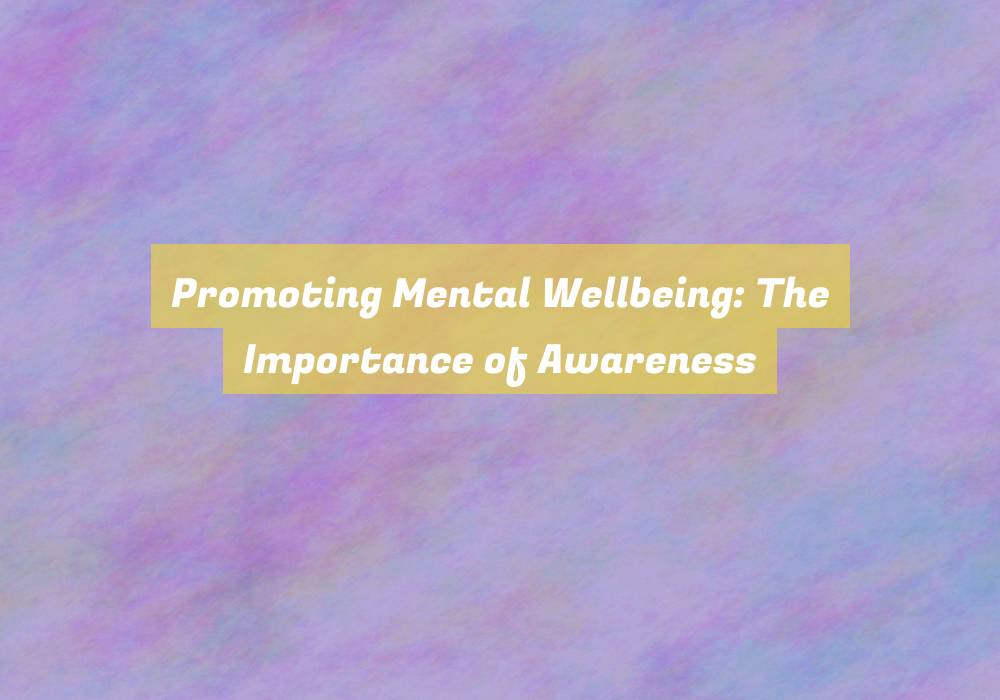Promoting Mental Wellbeing: The Importance of Awareness
You may have noticed that mental wellbeing is a topic that is gaining more attention in todayG??s society. However, there is a crucial aspect that often goes unnoticedG??mental health awareness.
ItG??s time to acknowledge the importance of understanding and destigmatizing mental health conditions, as well as empowering individuals to seek help.
But why is this awareness so vital, and how does it contribute to overall mental wellbeing?
Understanding Mental Health Awareness
Understanding mental health awareness is crucial for individuals and communities to recognize and support those experiencing mental health challenges. It involves being able to identify signs of mental distress in oneself and others, as well as understanding the importance of seeking help and support. By being aware of the prevalence and impact of mental health issues, you can contribute to reducing stigma and creating a supportive environment where people feel comfortable seeking help. It also means being knowledgeable about the resources and support available in your community, such as hotlines, counseling services, and support groups.
Furthermore, understanding mental health awareness involves being attuned to the various factors that can influence mental wellbeing, including stress, trauma, genetics, and environmental factors. This awareness empowers you to take proactive steps to maintain your own mental health and support others in doing the same. It also plays a crucial role in promoting empathy and understanding towards those experiencing mental health challenges, fostering a more compassionate and inclusive society.
Destigmatizing Mental Health Conditions
Recognizing the impact of mental health awareness, you can contribute to destigmatizing mental health conditions by fostering open conversations and understanding. ItG??s crucial to acknowledge that mental health conditions are common and can affect anyone, regardless of age, gender, or background. By openly discussing mental health and sharing personal experiences, you can help break down the barriers that perpetuate stigma.
Encouraging empathy and compassion in your interactions with those experiencing mental health challenges is also essential. Listening without judgment and offering support can make a significant difference in reducing stigma.
Furthermore, educating yourself and others about mental health conditions can help dispel myths and misconceptions. By understanding the facts and challenging stereotypes, you can actively combat the stigma surrounding mental illness. ItG??s important to use respectful language and avoid derogatory terms when discussing mental health. By choosing your words carefully, you can contribute to creating a more inclusive and supportive environment for individuals dealing with mental health conditions.
Destigmatizing mental health conditions requires collective effort. By taking these steps, you can play a vital role in creating a society that values and supports mental wellbeing.
Empowering Individuals to Seek Help
Encouraging individuals to prioritize their mental wellbeing and seek help when needed is a crucial step in fostering a supportive and healthy community. ItG??s important to understand that seeking help is a sign of strength, not weakness. By empowering yourself to recognize when you need support and taking proactive steps to seek it, you not only prioritize your own mental health but also set a positive example for others in your community.
Seeking help can come in various forms, whether itG??s reaching out to a mental health professional, confiding in a trusted friend or family member, or utilizing community support services. Remember that you deserve to receive the help and support you need, and itG??s okay to ask for it.
Empowerment also involves being informed about the resources available to you. Take the time to familiarize yourself with mental health support services in your area, such as hotlines, counseling centers, or support groups. Being aware of these resources can make it easier for you to take the important step of seeking help when you need it.
Ultimately, by empowering yourself to seek help, you contribute to creating a community where mental wellbeing is valued and supported.
Cultivating a Supportive Environment
Creating a supportive environment for mental wellbeing involves fostering open communication and understanding among members of the community. ItG??s essential to create spaces where individuals feel comfortable discussing their mental health without fear of judgment or stigma. Encouraging open dialogue about mental health challenges can help in normalizing the conversation and making it easier for individuals to seek support when needed.
In addition, promoting empathy and understanding within the community is crucial. This involves educating people about mental health issues and the impact they can have on individuals. By increasing awareness and understanding, the community can become more supportive and inclusive, creating an environment where individuals feel accepted and valued, regardless of their mental health status.
Furthermore, providing resources and access to mental health services within the community is vital for cultivating a supportive environment. This can include offering information about local support groups, counseling services, and helplines. By making these resources readily available, individuals are more likely to seek help when facing mental health challenges.
Ultimately, creating a supportive environment for mental wellbeing requires a collective effort to foster understanding, empathy, and access to resources within the community.
Conclusion
Take the time to understand and support mental health awareness.
By destigmatizing mental health conditions and empowering individuals to seek help, we can cultivate a supportive environment.
Together, letG??s make mental wellbeing a priority.







Your exploration of mental health awareness sheds light on an often overlooked but critical pillar of mental wellbeing. It strikes me that while we are making strides in discussing mental health openly, the nuances of mental health awareness frequently get lost in the shuffle.